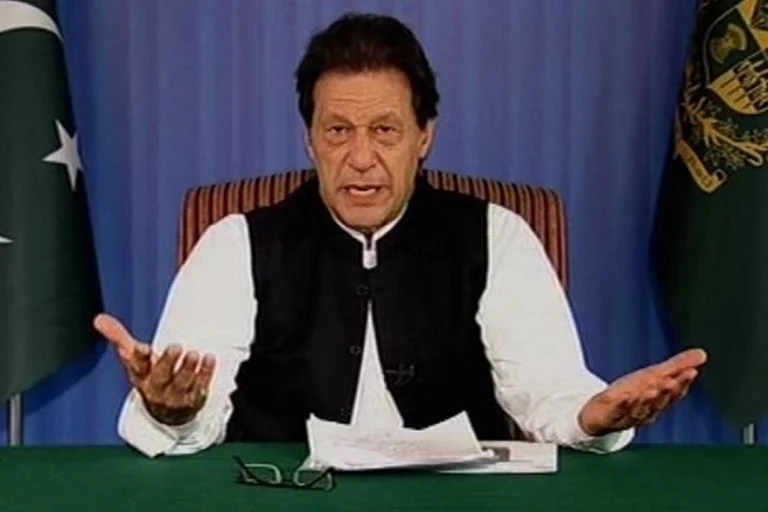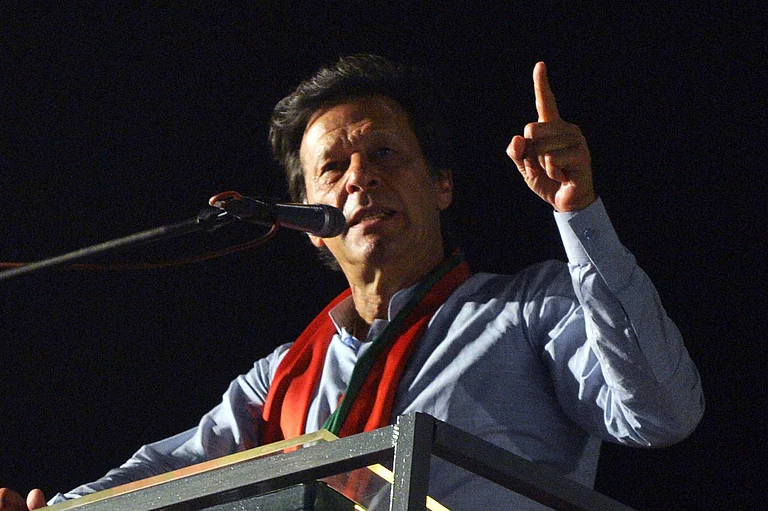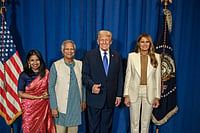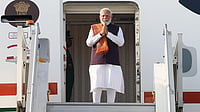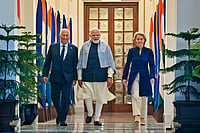Pakistan’s electorate has given a resounding answer to the country’s all-powerful military by voting for Imran Khan’s Pakistan Tehreek-e-Insaf (PTI) as the single-largest party in the National Assembly.
The Pakistan Army with the help of a compliant judiciary, an obliging Election Commission, and a caretaker government pulled out all the tricks in the bag to ensure that PTI supporters were frightened into submission and didn’t come out to vote, but the tactics and the cases filed against Khan have backfired. They failed to cower the electorate.
Speaking from prison in an AI-generated speech, Khan claimed that PTI-backed candidates were winning more than 170 seats and added that a “two-thirds majority” was secured. “You have set the foundation for your haqeeqi azaadi by voting yesterday…I congratulate you all for winning the 2024 elections,” said Khan.
The PTI has so far not got a simple majority — let alone a two-thirds majority.
The PTI is in no position to form the government. For one, though, it is the single-largest party in the NA, it does not have the numbers to get a simple majority. Unlike 2018, when Khan’s party though backed by the military was able to get just around 149, the establishment including the powerful Inter-Services Intelligence (ISI) got to work to get smaller parties and independents to support the PTI. This time, the help will be extended to the opposition to wean off the independents and ensure that a coalition government without the PTI is put in place.
Of the 220 National Assembly constituencies of which results are unofficially known, PTI-backed candidates have won in nearly 79, according to the latest figures released by Dawn newspaper. The Pakistan Muslim League-N (PML-N), which had the full backing of the Army is second with 63 seats, while the Pakistan People’s Party (PPP) has so far got 43 seats. Nawaz Sharif won a landslide in Lahore against PTI-backed Yasmin Rashid, but lost Mansehra another seat that he also contested. His brother Shehbaz Sharif, daughter Maryam Nawaz, and nephew Hamza Shehbaz have all been elected. PPP’s star Asif Zardari and Bilawal Bhutto both won. The MQM, the Karachi-based regional outfit, has won 14 seats.
As of now, the PTI is the single-largest party in the National Assembly, though it is unlikely to obtain a majority, but the establishment has got a loud and clear signal from the electorate that the days of political manipulation are over. So far, as the people are concerned, they have clearly shown their preference for Imran Khan’s PTI and are not willing to bend to the whims of the Army. Some important leaders of the PTI, who deserted Khan after he was voted out in a no-confidence motion, were punished by the electorate. Jehangir Tareen, once a close confidant of Imran Khan lost the elections. So has Parvez Khattak, chief minister of Khyber Pakhtunkhwa, who broke away to form his own party. All seven members of Khattak’s family have also lost. This is the price they had to pay for deserting the ‘kaptan’.
The Pakistan election results where no party is in a position to obtain a majority is not what the doctor ordered for Pakistan, which is facing a major financial crisis. What is required is a stable government that can work quietly without distraction to fix the country’s economy. A coalition government is prone to be constantly engaged in keeping all segments pleased and much political capital goes into keeping the government intact. What the IMF and investors are looking for from Pakistan is a period of political stability — unlikely in a rag-tag coalition.
The fractured mandate has ensured that political parties are on the ball trying to cobble up coalitions to form the next government. First off the block is Nawaz Sharif, the man most analysts in Pakistan say has the backing of Army chief General Asim Munir. PPP’s Asif Zardari and his son Bilawal have flown to Lahore for consultations on government formation. Bilawal had said during his campaign that the PPP would not form a government with the PML-N. However, he does not decide the party strategy. Sharif has called on all political parties to come together to form a government considering the grave economic crisis in the country.
“All the institutions in this country, everyone should together play a positive role in bringing Pakistan out of this crisis. This is everyone’s Pakistan, not just PML-N’s. Everyone should sit in harmony and bring Pakistan out of the difficulties. We can’t hold elections again and again,” said Sharif said to the press.
Sharif also said that it would have been good for the PML-N to win enough seats to form the government, but, as that was not the case, he has instructed his brother Shehbaz to begin preliminary discussions on government formation.
The PTI is naturally upbeat. Raoof Hasan, a former special assistant to Khan and now information secretary for the party, said, “People have roared their approval for PTI chairman-for-life Imran Khan.” Addressing reporters, he said “power-wielders must learn to respect people’s choice” while warning any effort to “derail the decision” will have “deadly consequences”.
The final results have not come in but what is clear so far is that no party is in a position to form the government. PML-N is working at getting a coalition together — whether PPP joins it or decides to work instead with Khan’s PTI-backed independents is the question. The best would be a national unity government to tide over the current grim economic situation but Khan is unlikely to join hands with Nawaz Sharif or Zardari. There is also speculation about PPP and Khan-backed independents joining hands. But all of this remains in the air at the moment.










